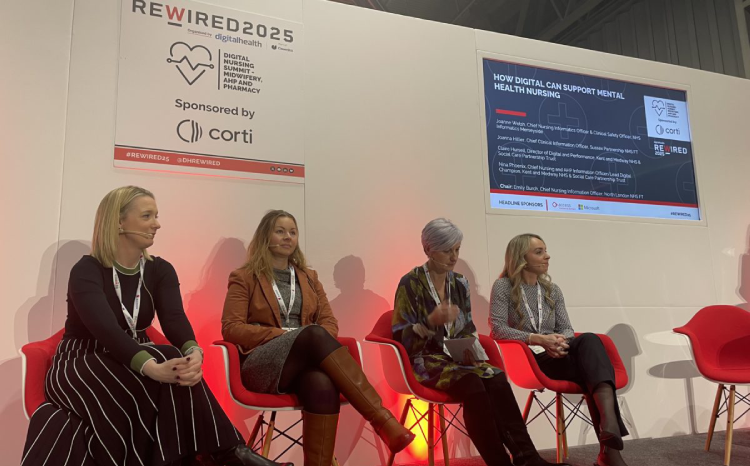iSoft director says NPfIT systems ‘interchangeable’
- 3 May 2007
 Nick Harte, product management commercial director at iSoft (pictured right), says the systems being delivered into the five clusters of the English NHS National Programme are all “interchangeable”, thanks to Connecting for Health’s decision to adopt a Service Orientated Architecture based around the spine services.
Nick Harte, product management commercial director at iSoft (pictured right), says the systems being delivered into the five clusters of the English NHS National Programme are all “interchangeable”, thanks to Connecting for Health’s decision to adopt a Service Orientated Architecture based around the spine services.
Harte, who led the development of iSoft’s Lorenzo product, said that this approach, combined with mandating of tough standards, means that iSoft could in theory now deliver elements of its software the South and London, with Cerner potentially doing the same into the three clusters iSoft software has been chosen for.
He told the audience that “the National Programme had wanted a very, very aggressive timetable”. Despite the initial pain he said the NHS National Programme for IT (NPfIT) had taken the right route in mandating tough standards and adopting a Service Orientated Architecture (SOA), the benefits of which were now being seen.
Outlining the scale of the challenge faced in, the North-west West Midlands, one of five clusters for the English NPfIT programme, he said: “In one region we’re having to replace 15,000 systems.”
He said that meeting the demands of the programme has proved too much for some companies. “There have been some changes to the major players. This is to be expected. IDX [now part of GE] struggled to meet the standards imposed upon them and were replaced.”
Despite these difficulties Harte said that in about 70 acute, mental health and community trusts the main existing PAS system had been replaced to date. “We’re now working on layering on the clinical functionality,” said the iSoft director.
Through its national procurement, NPfIT had “defined standards and demanded ruthless adherence to them.”
Harte stressed this ruthless standardisation included prohibiting local NHS trusts from selecting their own systems “It doesn’t allow individual trusts to do their own procurements.”
Referring to the way IT systems had previously been bought by NHS organisations he said: “Because the way we purchased and procured systems was never going to support the patient journey.” In the old world of local NHS IT procurements, he said “requirements for an integrated architecture were always an afterthought.”
But with an SOA and the national core systems now in place he said that the national programme was being made more locally responsive, with a local ownership programme now being introduced. “It will be possible for local SHAs to determine what systems they want, or at least what order they come in.”
Harte said that, with standards and core national infrastructure now in place, the additional supplier procurement was a “logical next step”, which he described as a “vindication” of Connecting for Health’s approach.
He acknowledged that clinical buy-in had been a problem though and said “The first three years of the programme have been about getting clinical engagement.”
The iSoft director said that one of the critical key decisions taken by the national programme was to define and adopt an SOA for healthcare, comprising centrally-provided national services – the spine ‘business services’. These include patient ID, security and authentication which can then be utilised by interoperable administrative and clinical applications.
The introduction of new national systems based on an SOA had brought fundamental changes, he added. “We’ve changed the focus nationally to a secure central repository of data. We’ve done this through secure role-based access, which is relatively unsophisticated so far but will grow over time.” The next step he said was the “introduction of legitimate relationships”.
He said an SOA was the only way to deliver the ambitions and scale required by the programme. “A Service Orientated Architecture recognises that no one company has the solution.”
“Interoperability is the key,” said the iSoft director. “All the elements of the solution being put in are ‘interchangeable.’ We could deliver aspects in once cluster and vice versa.”
Harte added that by providing core services centrally, which a small number of standardised applications can then access, it “enables organisations to focus on workflow and care configuration”.
A further advantage of the SOA model, he added, was that it provided the means to break down boundaries between organisations. “It does this by providing business services. It doesn’t matter where you get these services as long as it fits into the architecture.”
He explained that the SOA model with health applications using common business services, “Will always respond to end users in the same way, allowing users to move from organisation to organisation without having to re-learn systems.”
Identifying the key lessons that others could learn from the programme he cited the need for a SOA model to deliver at scale, providing the core infrastructure and business services “you can then plug in around the periphery.”
He also urged others not to try and develop and deliver software simultaneously. “Don’t mix development with delivery – there are already a lot of good things out there today.”




